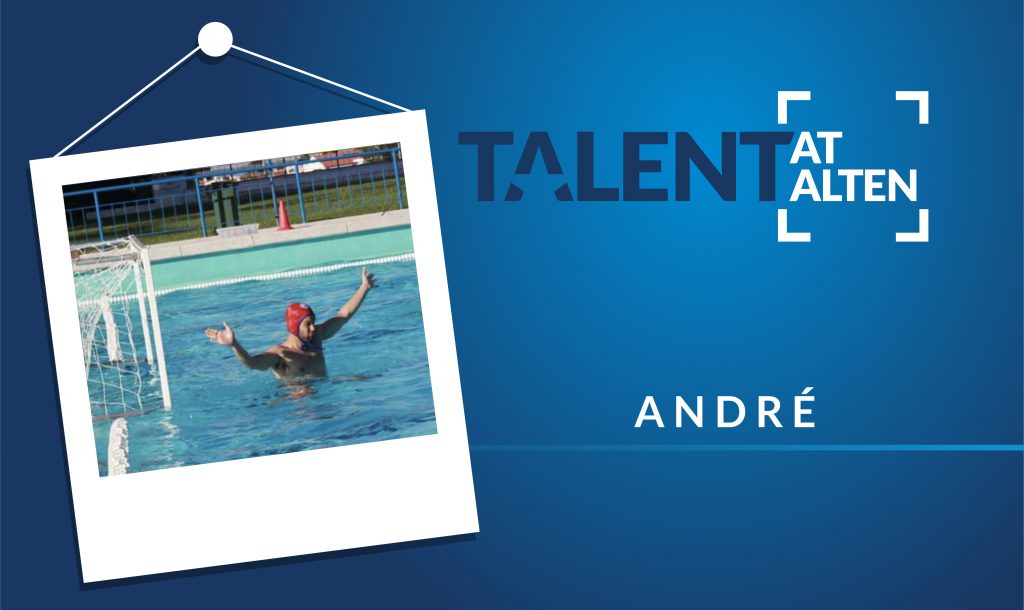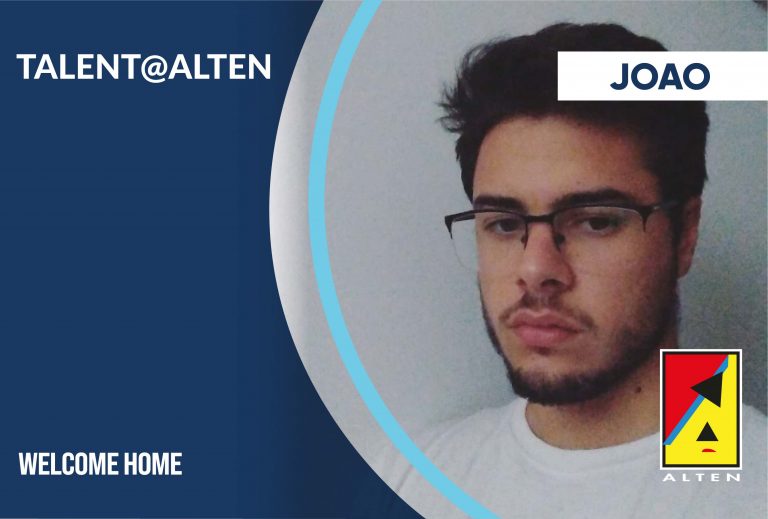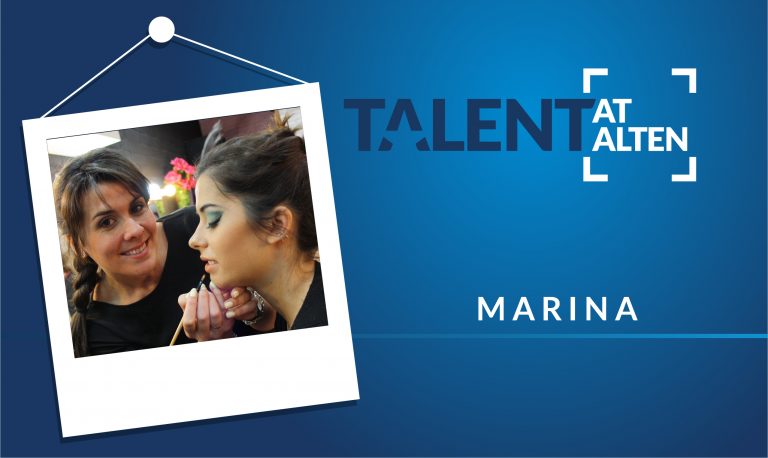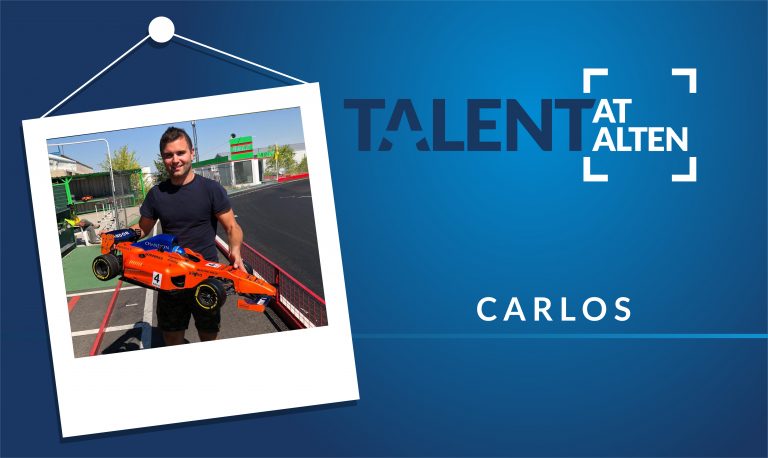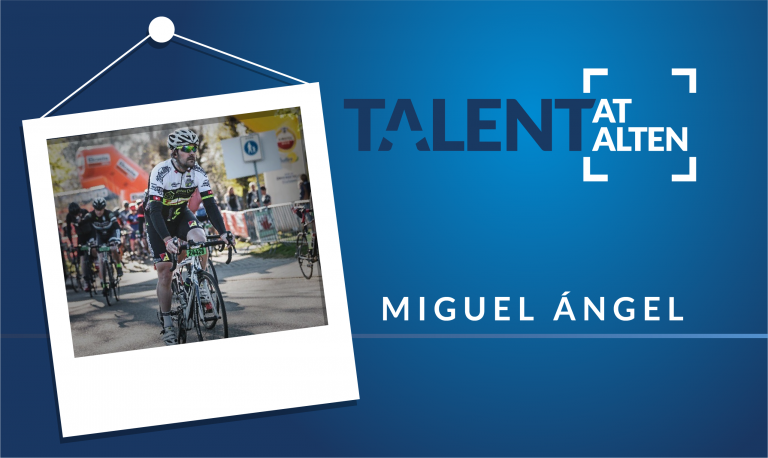Our colleague works as a consultant in ALTEN Portugal, but he does much more than go back home after work. We invite you to meet someone that seizes all the hours of a day. He plays water polo as goalkeeper in a federated team, practices bodyboard, BTT and climbing; and, if that is not enough, he also plays the guitar. Keep reading to meet André.
Water polo is not a sport everyone knows deep; how and when did you start your interest in this hobby?
All started when I was twelve years old. I used to practice Judo but due to some postural problems, I had to get back swimming. In swimming classes, I was invited to experiment a water polo training. I liked it, so I stayed.
Were the team federated by the moment you start playing in it?
Well, they were a federated team, the guys that would be part of my team. But I passed 2 years in the formation team because my parents did not let me train until late hours. The trainings started only at 8:30 PM. The year I really started playing with my team, I entered as a federated. In that year we would compete for the national championship and my parents had the pressure to let me be part of the federated team since they would need a new goalkeeper.
Does this sport take so much time of your days? How many times do you have to train?
I have to train every day. Every day is important because it is a sport that played inside the water. Since we are not in our natural ambient, we must train all days to improve or just to maintain our physical preparation, our technique and our tactics. Well, we rest at weekends, when there is no match or supplementary training.
Time was my enemy during university and during my second job. In those periods I had to decrease the number of trainings per week, sometimes drastically since I also worked in shifts. Time was responsible also for changing teams: I left a federated team that was disputing the leadership of the first division championship and started playing in my university team. Which was not a federated team but at least, that year it started playing in the second division (Portugal has two divisions with eight to ten teams each, typically).
How do you prepare for the matches?
As a goalkeeper, I do not have a specific trainer (or coach). Because of my experience and many years as a goalkeeper, I am responsible for my training and sometimes for the preparation of the younger goalkeepers as well. In some countries where water polo is played professionally, goalkeepers count on dedicated coaches but is not the case in Portugal. Since I integrated my university team, I was named as captain (and sometimes coach) and I was also responsible for preparing my team for each game.
Nowadays I am playing in my old team, although all my old teammates are away or stopped playing water polo. The team had to start all over again, playing in the second division championship, and I still have that responsibility. Get the team to the limit is the best way for me to prepare for the match since it also functions in reverse. The better I perform, the biggest will be their challenge and the other way around. Evolution depends on each team member dedication.
Mentally, I try to remember all my mistakes and to think about how I can correct them during pieces of training and matches in all aspects: physical, reactional, technical and specific situations that may happen.
Do you feel an extra-pressure for being the goalkeeper?
I always feel that pressure. Sometimes more than others. During my time disputing the championship leadership, I felt that pressure because each goal suffered was important. In that time, I was always looking for excellence in my performance. Later, in university, I felt that pressure because I was the only player with first division experience. Nowadays I still feel a little of that pressure, since my teammates have a lot of faith in me when the issue is to overcome our limitations when playing against similar or better teams.
Which one has been the most difficult time as a water polo player? And the best one?
The most difficult was, definitely, my first time as the goalkeeper of my university team. Since I stopped suffering 0 to 15 goals per game and started to suffer 20, 30 or more per match. Mentally, it was exhausting for some time.
The most gratifying were the two silver medals won twice in a row, playing the national first division championship, just before I entered my university team. It would be better if we have won the gold, especially because it was disputed against the same team two years straight (by the way, it was one of the times we lost by one goal. That was hard).
What kind of benefits do you think water polo gives you, personally and professionally?
Water polo benefits me personally and professionally in the same measure. I can’t measure one more than others. Sport has always been my escape, a reset. It also has taught me much and mould me as a person and as a professional. With water polo, I learnt to be disciplined, to be a leader, to overcome challenges, to learn from mistakes, to be always prepared, to improve myself, to work as a team, to win but also to lose and rise again, and to do that every single day and every single moment of the game. As well as in life.
You have many hobbies; do you find time for every one of them?
That’s a problem! I do not find the time for all my hobbies, especially nowadays. This year I am committed with myself in training every day after work. I lost much of my performance in the last year. Time for family and friends, or simply for dedicate to me or my new home, get shorter and I have to compensate it on weekends.
Recently, I find it hard to get time to do BTT and bodyboard. Climbing and guitar are pending. My guitar is resting near my sofa and it has been several days since the last time I played it (I will play it today!).
I love climbing but I do not have experience or friends that like it as well, so I only did it a few times. More often I can do BTT with a friend, a member of my team. But time for big travels, that takes several days, got shorter as well. In the last one, we discovered the Dão and Vouga eco-tracks in a 3 days bicycle ride. We used to go to Sintra, Belas or Monsanto for a morning cycling, but not as many times as I would like.
We rarely do a day ride, something like Amadora – Setúbal, passing in Lagoa de Albufeira and Costa da Caparica and Arrábida beaches. Only a handful of times I took the bicycle to go to work, doing the path between the train station and the company. However, it is not viable since I do most of the way on the train at rush hour.
If you have to choose just one hobby, which one would it be?
I think I would choose BTT because it is easier to get more time or opportunities for practising it.
Do you think having a hobby is rewarding for everyone?
Sure. Every hobby is important for people to get out of their routines and for developing other skills.
Would you like to tell us anything else about you?
I also worked as a Lifeguard during my life as. As a Lifeguard I pass through many interesting experiences, some of them helped me gain useful skills.



